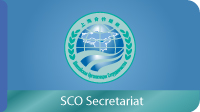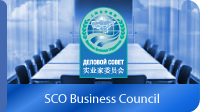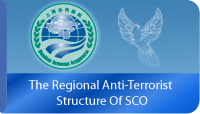|
Q.: We are discussing a new and unique model, the SCO Network University. What state is it currently in?
A.: The University has been launched. We officially announced this last year at the meeting of SCO education ministers. We are currently at the stage of pilot launch. The University’s Master’s program opened last September. This means that the first students, up to 20 people, went to visit each other: Kazakh students went to Russia and, partially, China, Chinese students to Russia and to Kazakhstan, i.e. exchanges have begun. The SCO University at the moment unites over 60 leading universities working on a territory with the biggest population and, consequently, the biggest number of potential students.
Let me recall, that the foundation for this was laid in 2008-2009; in 2010, the first stage was completed, like the construction of the ground floor if we compare it to the construction of a building; now we need to move further. Next floors will be Bachelor’s programs and post-graduate studies.
It is important to understand that students that go to study at other universities after the Bachelor’s program don’t have a language barrier and can easily understand the lectures…
Let me recall that the University’s two main languages are Russian and Chinese, the same as the main working languages of the SCO. At the same time, leading universities that are part of the SCO University system have the right to use national languages for teaching, but the concept requires that any university should ensure that there is also teaching in either Russian or Chinese. We recruit students who meet the minimum language requirements. Notably, Russia has a practice of testing the knowledge of Russian as a foreign language, which implies a minimum level of command of the language needed to listen to lectures. China has a similar practice.
Launching the SCO University, we developed methodological aids for training future Masters in Russian and Chinese and held advanced training courses for teachers in Russia, Kazakhstan and Kyrgyzstan. A student coming to study under a Master’s program is expected to meet the basic language requirements, which are listed in the student admission agreement. If students don’t know the language sufficiently, they have the right to undergo additional courses, but outside the SCO University. We recommend teaching students the language at home, at their own universities.
Q.: Could you please explain how the exchange mechanism functions?
A.: Overall, the model of the SCO University envisages multilateral exchanges, i.e. in theory, a student may study at an unlimited number of countries and universities. However, we currently use a bilateral model, not a multilateral one, and there are objective reasons for this. At present, we offer only Master’s programs that last two years, and there is not much time to travel around. At the moment, the scheme is as follows: a Kazakh student of a Master’s program goes to Russia, and a Russian student goes to Kazakhstan. Russia allocates additional quotas for admitting foreign students within the SCO University for those universities that have become the SCOU’s leading universities. This is a standard model, but its advantage is that it allows further expanding. We will soon open Bachelor’s programs, and then there will be an opportunity to study at several universities.
Q.: Is there a similar university model in the world?
A.: As to whether the SCO University borrowed something from French, British and other universities…
There are a lot of similar institutions, but the SCO University has a unique form. We meticulously studied the experience of many network universities, but, due to the peculiarities of the SCO, we had to work out our own model. For example, you can notice that some things are common with Asian universities based on the common education model of ASEAN member states, where student exchanges are regular. You can also find some traits of universities in the British Commonwealth, which also have active student exchanges. But in the latter case, universities have Britain as the center of educational policies, so New Zealand, Singapore, Australia and other Commonwealth countries look up to it. English professors read lectures at Singaporean universities online via the Internet.
We, however, use a different model. This is, first of all, a model of “distributed education,” which does not envisage a single “education leader.” This is important, because the Shanghai Cooperation Organization does not have a leader either, everyone is equal. Secondly, the SCO University initially introduced a multilateral education model. This means that, unlike, say, a student from Singapore, our student doesn’t study under a specific British program, but instead goes to other countries to attend different selected courses.
Third, many programs are to a significant extent standardized, and students are not always interested in them. Say, if a Russian student comes to China, he or she is unlikely to be excited about a course in social and public disciplines that are similar to courses of the Soviet era. However, there are unique courses that are taught only in China. So an SCOU student attends only certain modules of disciplines. They consist of several courses united under a common theme. For example, these can be courses devoted to water protection and use in Asia that can have several subjects – water use, protection of water resources, etc. Suppose, these courses are best taught at a specific university in a country. A student goes and attends this module, which is included in his or her basic program. At the same time, they have the right to complete the course and get a diploma of the hosting university after passing the exams. But our rules do not require two diplomas be obtained necessarily.
Q.: So the distribution system allows getting the best courses from each university?
A.: Exactly. Let me give you an example from Russia. We have a successful training program in ecology, which is a relevant and sensitive issue for many SCO member states. All environmental problems are trans-border, and we need professionals that would understand how to resolve common problems without infringing on each other’s interests. However, ecology is divided into water ecology, nuclear power generation ecology, animal ecology, and so on. We have several universities that deal with the subject, and each specializes in a specific topic. Looking at programs and courses on offer, a student from China, Tajikistan, Kyrgyzstan or Kazakhstan can choose a direction and go to Krasnoyarsk, Novosibirsk, Moscow or somewhere else. Another popular area of studies is regional studies. This subject is represented at four Russian universities: the Moscow State University, the Ural State University, the Moscow State Linguistic University and the Moscow Institute of International Relations; all of them offer absolutely different courses. Some deal with problems that are common for Asia, some with regional interaction. A foreign student has an opportunity to choose specialization. Similarly, our students can choose among Chinese and Kazakh programs.
Q.: Isn’t there danger in this of a young person becoming an “eternal student”?
A.: In any case, they must complete the program over the two years that a Master’s program lasts. Where they do it, it is up for them and for the management of their basic university to decide, but after the two years are over, they must pass exams at their alma mater and obtain the primary diploma. If they want, they may pass exams at a Chinese or other university and obtain a second diploma. Any way, they will be getting two documents, a diploma from their alma mater and a certificate of the SCO University that lists all courses they have attended. This document meets all the international standards. We hope that the certificate will later be transformed into a SCO University diploma; this initiative is supported by all countries, including Russia. But this is not a matter of one day. It is a matter of time.
Q.: You are one of the ideologists of the SCO University project and you have invested a lot of intellectual effort and time into its setup. Does the Shanghai Cooperation Organization really need such a university?
A.: This is a matter of absolute necessity. In order to understand why the SCO University is needed, it is necessary to understand the main problem of the SCO. This organization emerged very timely for its geopolitical and economic space. However, this timeliness has so far been unable to produce any efficient real interaction. Why? Because we are dealing with countries that are at different levels of economic development, different levels of social development and have different approaches to power. We should also not forget about such a factor as natural competition between countries, including for resources; we should remember the existence of certain local problems. Many bilateral ties cannot be mechanically transformed into multilateral contacts, and this is a problem not only for the SCO, but also for ASEAN, the South Asian Association for Regional Cooperation and other organizations in Asia, so we need to raise a new generation of people that would be knowledgeable of other countries’ problems well, who would understand different national mentalities, peculiarities of work ethics and doing business in other countries. To do so, we need trans-border, transnational specialists, and the SCO University has been designed to resolve this problem.
Q.: What areas of studies has the SCO University chosen?
A.: It is most important not to make a mistake when selecting areas of studies. As of now, it has announced five areas for training specialists. They do not include such trendy areas as economics and law. We consciously started with topical areas as opposed to trendy ones: energy, ecology, IT technology, regional studies (i.e. understanding of nations’ history and traditions) and, of course, nanotechnology. Nanotechnology is now the focus everywhere – in China, Kazakhstan and in Russia. But the amount of knowledge required for pursuing nanopolicies is such that it can be obtained only in joint laboratories. The goal of our university is to bring together people to discuss these problems. By the way, the list of areas was suggested by the Russian party and other countries endorsed it without amendments, which means that it meets the needs of SCO member states.
Q.: The project seems ambitious and this explains the caution and meticulousness with which it is being implemented. What can you say about its difficulties, expected and unexpected?
A.: We were figuring out all the nuances of the project back in 2008. Let me recall that the setup of the SCO University was Russia’s initiative. It was suggested by Vladimir Putin at the summit of SCO heads of state in Bishkek in 2007. However, it is necessary to distinguish between an initiative and a working proposal. Initiatives are numerous, but only few then become working proposals.
In the first half of 2008, Russia came up with the working proposal. Coordinating it took a year, because we were working in conditions no one had ever figured out. I hope that the model we have developed will go down into textbooks with all its advantages and disadvantages, serving as an example of how such universities are founded. At the meeting of SCO education ministers in Astana in October 2008, the Concept of the SCO University was adopted; it was amended in September 2010, at a meeting in Novosibirsk.
Remarkably, the concept, which was adopted almost four years ago, has proved not only viable, but also quite successful, becoming a good example of useful collective discussions of experts from many countries.
Now to the difficulties. A lot was predicted in advance. First of all, the different levels of education standards, education policies and education requirements, different levels of control over the quality of knowledge. We took into account the inertia of some countries and regional universities; we treated ambitions as reality that could not simply be discarded. There were cases when individual Chinese or Russian universities would say that they would set up an SCO university on their own, failing to understand that it is impossible to do so without coordination with all of the organization’s member states.
Of course, we also worked on financial issues. Obviously, no university would be able to carry this financial burden alone. Russia took an unprecedented step by shouldering the financing of the project at the initial stage. All documents, from the first word to the last, were prepared by the Russian party, but, of course, were coordinated with experts from other countries. I believe Russia acted as an intelligent international power, approaching the project with responsibility.
Q.: The status of a university is always important. Could you dwell on it?
A.: The problem of the status is among the expected problems. For example, we are facing the task of setting up the University’s headquarters - a secretariat or rectorate, because even though it is a network university and education is distributed, it still needs a place where documents are stored, where control is exercised. Any country is willing to accept the secretariat as a university structure, but it is a matter of financing. We understand that the problem should be discussed meticulously and cautiously, in order not to infringe on interests of any country.
The rectorate should be modeled after the SCO Secretariat (it is actually the University’s peculiarity that its principles and structures are to a large extent similar to those of the SCO itself), i.e. it should be an extraterritorial body and have a representative from each country. Another task concerns forms of financing of the SCO University’s programs. Like in the SCO, there will definitely be a question about joint financing of the university’s budget and spending and everything will be based on proportionate distribution, with each country contributing a certain share. Participating in forming of the budget, each country will have the right to veto its spending.
The third problem is the problem of the university’s status and international recognition, but it can be resolved, including by resolving the first two problems.
We had to deal with a lot of tasks no one had encountered before. Let me give you just one example. Many people suggested setting up the university as a separate legal entity, but a legal entity can be registered only in one country, while this was supposed to be an international organization. Many people are used to a university having its stamp and legal address. What were we to do? But ask yourself where the WHO, UNESCO or ASEAN are registered? Nowhere. But no one says that these are failed organizations only because they don’t have registration. It is time we started thinking in transnational categories.
The university’s high status will be ensured by the success and quality of its study programs. The main goal today is to make the program competitive. Yes, there are countries that are leaders in the education sphere, where everyone wants to study. But there are countries that are less popular in this sphere and their goal is to come up with programs that would attract attention. For example, Russian specialists would like to study problems of national heritage and its protection or use of energy resources in Kyrgyzstan, Tajikistan or Uzbekistan. That is, we need to offer programs that would fit in with the national needs and opportunities.
Q.: What exactly has been done to launch the SCO University?
A.: First of all, we developed a system for selecting universities for the SCO University. Let me recall that the SCOU is a network of several dozens of leading (basic) universities in each of the five SCO member states that represent leading educational establishments and schools of thought. Russia has drafted and submitted for general approval the selection criteria. We took into account the number of schools of thought, the quality of education, the living conditions and the level of healthcare provided to students. Russia selected universities following these criteria, and other countries also chose their leading universities with these criteria in mind. Secondly, we elaborated on the very system of interaction between universities, setting up national and international expert groups for each area of studies. This means that experts representing universities worked to agree on nuances of joint programs, while national education agencies developed common standards for approving these programs. Our third achievement was working out clear, stage-by-stage, but simple criteria for developing and endorsing programs that were named “five steps for endorsing Master’s programs.” Fourth, we suggested a concept of “priority courses”: each university can come up with several courses or program modules that are to a certain extent unique and best represent this university’s school of thought. Finally, we drafted a number of documents that determine the status of all of the university’s bodies and the status of the SCOU certificate and its appendix with a student’s grades.
Q.: Can the idea of the SCO University be seen as the consequence of globalization or is it a purely pragmatic product of the SCO, brought about by our reality?
A: Globalization itself has pragmatic goals, so the SCO University follows in the wake of global educational trends. Today, there is another trend apart from globalization, and that is communalization. That means the setup of transnational communities that are united to resolve common problems. These may be problems of counteracting terrorism, of energy development, and so on. In this case, we have a purely pragmatic phenomenon, the SCO University.
This structure serves to achieve specific goals: it trains personnel for the SCO countries and simultaneously fulfills international tasks of general development. Notably, some countries that are members of the University are participants of the Bologna Process (Russia), some are in the transient stage (Kazakhstan), some have their own standards (Tajikistan) and some have very specific standards (China, where the education system represents a mix of British and American systems).
Q.: What is the opinion about the SCO University among your colleagues in the West? What do they say?
A.: The very first opinions, usually voiced by incompetent people, boiled down to the SCO University being still-born. However, the SCO was also viewed as a dead-end organization at the beginning. But any organization that unites both Asian and European countries follows the “Asian path.” This is a path of long talks and achieving consensus through negotiation. Until there is consensus, a decision is not made.
The Americans were skeptical about the idea. Britain, which used to rule half the world, said it was impossible to unite the European and Asian education systems on equal terms. It was also said that, with two obvious leaders of the education market – China and Russia, a confrontation was unavoidable, that there will be camps, some countries siding with China and others with Russia. That was bound to lead to a conflict.
Fortunately, it hasn’t happened this way. We should be grateful to our colleagues outside Russia – in Kazakhstan, Kyrgyzstan and Tajikistan, for really agreeing to a dialog. Neither I nor my colleagues have come across national ambitions, perhaps, because we are all products of the Soviet education system and understand each other well.
In 2010, when it became clear that the university would be launched, the agreement was signed and the programs ready, available for examination, the SCO University was pointed to as an example of “a sensible dialog in the education sphere” (I heard this in 2010 at an education conference in New York).
Q.: How will the SCO University welcome its second academic year?
A.: Our next goal is to continue exchange between students of Master’s programs and to launch Bachelor’s programs. The latter is more complicated, because these programs take four years, and students have more opportunities to visit other countries. We want to direct students’ flows not only to Russia and China, but also to other SCO member states. Yet another task is to launch joint post-graduate studies and to carry out joint research. This is envisaged by the university’s concept and has been agreed upon. Now we need to build the system of defending theses. We plan to complete this work within the next year.
The potential of the SCO University is not fully developed yet. We still don’t have joint laboratories or joint magazines, we are only working on a joint information Internet platform that will reflect the University’s research and educational activities. We need to participate in big international conferences, to improve methods, to introduce online teaching. Introduction of new education technologies and of a full-fledged home study education in combination with expanded academic mobility, it will be another breakthrough.
Q.: The success of the SCO University directly depends on the success of the SCO. How do you assess the viability and prospects of the organization?
A.: The organization is not going to die, and this is obvious. Apart from the issue of viability, there is the issue of success. The SCO is to a large extent an Asian organization, and many organizations in the region are set up not so much to improve relations as to prevent them from deteriorating. In this respect, the SCO acts as a tie. Such organizations are also set up to mark off the spheres of influence and areas of conflict. In these terms, the SCO has been absolutely successful in the course of ten years.
Speaking of the SCO’s prospects, I don’t think we should expect a very ambitious development. We should view the SCO not as an EU analog, but as an Asian organization, which develops and stabilizes very slowly. In my opinion, the SCO should not squander its energy on different projects and goals. It should focus on two main areas: ensuring security (the goal that was announced initially and is being achieved successfully) and education projects in order to raise a new generation. The rest will be resolved on its own.
|






















Leave a comment